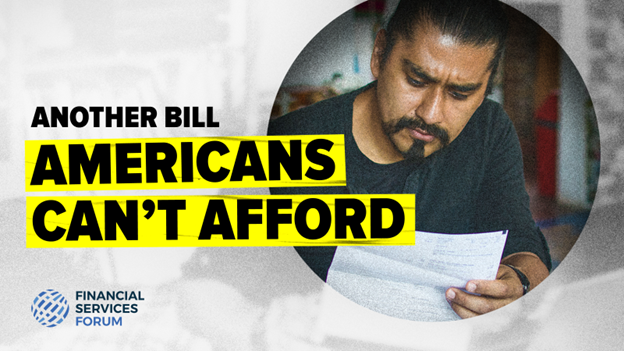Dear reader,
Welcome to the latest edition of The Forum File. In this edition, we highlight Wells Fargo’s neurodiverse employment program.
We hope you enjoy reading this edition and please do not hesitate to share your feedback.
Kevin Fromer, President and CEO, Financial Services Forum
Value Add
Wells Fargo’s Neurodiversity Program celebrates the range of differences among individuals and provides structure and support to help all employees flourish.

Wells Fargo’s Neurodiversity Program launched in April 2020 as part of the company’s overall commitment to hiring skilled talent and building a diverse workforce.
Neurodiversity describes the range of differences in individual brain functions and behavioral traits regarded as a component of normal variation in the human population. It includes inherent cognitive considerations, such as Autism, Dyslexia, Attention Deficit Hyperactivity Disorder (ADHD), and Tourette syndrome, among others — a skilled population that historically has been disproportionately underserved in the job market.
The National Library of Medicine cites 15-20% of the U.S. population is diagnosed as “neurodivergent.” This is comprised of 10% (33M) of people who are diagnosed with dyslexia, 5% (15M) who are diagnosed with ADHD, and up to 2% (6.6M) who are diagnosed with Autism.
And according to the University of Connecticut Center for Neurodiversity and Employment, unemployment for neurodivergent adults is estimated at 30-40% which is three times the rate of the broader people with disabilities segment and eight times the rate of those without disabilities.
The work-entry barrier can be exacerbated by differences in social norms between hiring managers and prospective job candidates, which is part of what the Wells Fargo Neurodiversity Program has improved through facilitation of an inclusive and accommodating skills-based hiring model that allows candidates to showcase their talent in a more comfortable environment over the course of several days. The program also delivers education, individualized support, training, coaching and enablement programs to enrich the lives and work experience of our employees. In addition, workplace accommodations may also be available to help individuals succeed on their career journey.
Stephen DeStefani, Wells Fargo Technology Business Services executive, and leader of the Enterprise Neurodiversity Program, calls the program the most rewarding work of his career. The impact of the Wells Fargo Neurodiversity program to date is:
- Nearly 99% of our neurodiversity hires are still employed with Wells Fargo.
- 215 participating Wells Fargo’s hiring managers.
- The program has been implemented in the U.S., and India with a formal launch in EMEA in 2024.
DeStefani says the program is on track to have hired over 300 employees globally by the end of 2023 across eight of Wells Fargo core business lines and seven different technology and non-technology roles. “For 2023 we are also tracking over 40% of our hires are women and 55% identifying as Black, Hispanic or multi-racial. DeStefani said. “Inclusion is a 360-degree view, and we continue to expand the program across our enterprise, with continued support from critical non-profit partners including the University of Connecticut’s Center for Neurodiversity and Employment & Innovation and the Autism Society of America.”
Capital Gains
What we’re doing in Washington

The Forum and its members launched a new campaign, Americans Can’t Afford It, highlighting the economic consequences of proposed capital requirements on consumers, small businesses, and the economy at large.
The Forum released its latest Policy Cents video featuring Forum President and CEO Kevin Fromer on the role of the nation’s largest banks in community infrastructure projects. Watch the entire series here.
The Forum issued a statement following the announcements by the banking agencies to extend the comment periods for the Basel III Endgame and GSIB surcharge proposals. “The agencies must provide the public with an appropriate opportunity to review and comment on the collected data on an aggregate basis and their implications for the proposals before the rules are finalized,” Forum President and CEO Kevin Fromer said. “Anything less would deprive the public of an open and transparent rulemaking process.”
Our Two Cents
Research from the Forum
In the latest blog post from our Capital Insights series, Chief Economist and Head of Policy Research Sean Campbell discussed the potential impact of proposed operational risk capital requirements on the cost and availability of all financial products and services provided by large banks.
Additionally, a joint blog post with the Securities Industry and Financial Markets Association and the Bank Policy Institute, highlighted how the U.S. GSIB surcharge methodology differs from international norms, which places the U.S. at a competitive disadvantage.
Checking the Balance
Members in the News
Bank of America again increased its U.S. minimum hourly wage for employees on its path to $25 by 2025. The company moved to $23 in October, increasing the minimum annualized salary for full-time employees to nearly $48,000. This move builds on the bank’s history of being a national leader in establishing a minimum rate of pay for U.S. hourly employees.
BNY Mellon launched Bankify, an open banking payments solution that helps organizations receive consumer payments from bank accounts. Clients will be able to offer end users the ability to make payments directly from their bank accounts as an alternative to credit or debit cards and third-party payment platforms.
Citi partnered with six Hispanic-owned firms to syndicate a $750 million bond issuance in honor of National Hispanic Heritage Month. Specifically, the firm issued $750 million of Floating Rate Notes, which are due in 2025. This project marks a new milestone in strengthening relations with traditionally underrepresented firms – which also includes women- and veteran-owned broker-dealers – and in working collectively to enable economic growth and progress.
Goldman Sachs broke ground on its Dallas Campus. With the new building, Goldman Sachs will have the capacity to house more than 5,000 people, core to bringing its people together in the Dallas metro area. The project will also promote opportunities to work with small, diverse and local talent as part of the firm’s supplier diversity goals.
JPMorgan Chase Wealth Management’s Wealth Plan, a digital financial planner, won a Real Simple 2023 Smart Money Award in the Financial Literacy category. Real Simple magazine honored the best new apps, accounts and services in personal finance.
Morgan Stanley at Work announced a charitable giving solution, which simplifies corporate clients’ and their employees’ abilities to donate through a donor-advised fund platform. The Charitable Giving Program provides a dynamic and effective framework that enables organizations to support causes about which they are passionate.
State Street announced that several of the firm’s executive leaders have been named to 2023 HERoes Advocate Executives Role Model List and to American Banker’s “Most Powerful Women” Lists. The HERoes awards recognize advocates of female leadership and gender diversity in the financial industry and the American Banker’s Most Powerful Women in Finance list celebrates the industry’s most influential female executives in financial services for their business acumen.
Wells Fargo awarded nearly $11 million in grants to 28 organizations across six states as part of its Invest Native program. Invest Native is a $20 million philanthropic initiative by Wells Fargo to strengthen housing access and affordability, small business growth and sustainability in Native communities.